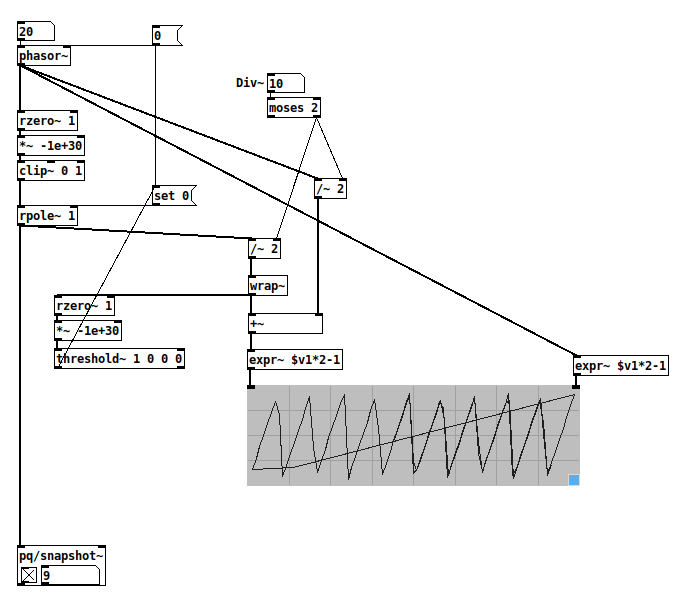-
kyro
posted in technical issues • read moreSymbols can be used in data structures. However, you can't just feed [append] (or even plain [set]) with symbols. The workaround is to use the pointer of the created data structure to edit its symbols with a [set] to which you give the
-symbolargument. -
kyro
posted in technical issues • read moreWell, unfortunately, as the help says, "with a 512 sample delay, it begins to attenuate at about 110Hz". To keep decent low frequencies I have to use at least 2048 according to my quick test. No easy solution to the problem I guess.
-
kyro
posted in technical issues • read moreHello,
I can't find the source to it anymore, but to remove DC offset I use
[rzero~1]
|
[rpole~ 0.995]which is practically perfect for my use, except it messes with waveforms due to inherent phase shift. Is there any way to cancel/revert this phase shift with, say, an allpass filter ? If so, how should I tune that?
-
kyro
posted in technical issues • read moreMaybe should you have
[loadbang}
|
[float 6]
|
[until]instead? Anyway, you can execute pd with the -noloadbang option to edit your patch.
-
kyro
posted in technical issues • read more@oid said:
Non-linear elements in the feedback path can be fun and do some interesting things but far from a general purpose filter, no clue if pd will play well with that sort of abuse.
In my humble experience: very well. I've been working on an "acoustic feedback" patch for a while now. With allpass/diffusion, peak filter and basic distortion in the loop, it was quite lively and convincing.
-
kyro
posted in extra~ • read moreHi,
Has anybody managed to get pd spectral toolkit working?
I'm especially interested in the GEM waterfall spectrum but alas, i getpd-externals/SpectralToolkit/pd_spectral_toolkit.l_ia64: undefined symbol: _ZGVbN2v_exp pd_spectral_toolkit: can't load libraryon startup.
make linuxdidn't complain about anything. -
kyro
posted in patch~ • read moreI love this feedback oscillator! I don't know how relevant it is, but it reminded me of https://ccrma.stanford.edu/software/snd/snd/fm.html [cascade FM: sin(sin(sin))]:
As z increases above 1.27, we get a square wave, then period doubling, and finally (ca. 1.97) chaos.
-
kyro
posted in technical issues • read more@chaosprint said:
For example, I would like to trigger a sound playback multiple times
it layers the playback at that particular rateYou mean, like a polyphonic sampler? If so I'd load the sample in a table and have an instance of tabread~/tabread4~ for each "layer".
-
kyro
posted in patch~ • read more@jameslo said:
If you follow the algorithm in http://cgm.cs.mcgill.ca/~godfried/publications/banff.pdf, E(5,13) = 1001010010100, But if you use the much simpler one from @Stutter you get 1001001010010.
If you flip stutter's result three digits to the left you get banff's. It's a matter of a [- 3] somewhere.
-
kyro
posted in I/O hardware diy • read moreIf I had to buy something today I'd go for Intech EN16. Fighting my impulse buy a while back, I dug out my old dusty bcr2000, found out it had a software editor and could be set in absolute mode. And I don't need anything more.
With encoders set to absolute, no need for two-way communication, no more jumps in values, everything stays in the patch. I have a set of WIP abstractions that steal the focus of the shared unique controller, map and scale CC increments/decrements to the relevant patch parameters and deals with store/restore presets.
I just wish there were something to faders like what encoders are to knobs.
-
kyro
posted in patch~ • read morehttp://www.pd-tutorial.com/english/ch03s08.html was a great help for me back in time.
-
-
kyro
posted in technical issues • read more@ddw_music very nice! With your downward edge detection I can now divide a phasor~ by an arbitrary number. There's a thing I cannot wrap my head around though: how to reset the counter to zero every divided downward edge. So it can safely be run indefinitely.
I don't understand why feeding the rpole~ argument with ((1-(divided downward edge detection)) delayed by one sample) only resets it once in a while and not every cycle.
-
-
kyro
posted in technical issues • read moreso I totally gave up on solving my maths problems in pd. I used FAUST instead and run my tonestack~.dsp in [faustgen~].
you can access the 3 parameters with [low/med/top $1( from 0 to 1.
first time with FAUST, looks awesome. -
kyro
posted in technical issues • read moreWew lads! What a complicated topic. Finding real roots for the denominator, finding either 3 real or 1 real and 2 conjugated complex roots for the numerator... The current filter is 100% highly unstable, I hope I'll get it working eventually.
-
kyro
posted in technical issues • read moreso far my best guess would be https://en.wikipedia.org/wiki/Cubic_equation#Trigonometric_solution_for_three_real_roots
-
kyro
posted in technical issues • read moreHi,
I'd like to implement in pure data the tone stack model I found in the DAFX book. It's a linear third order transfer function. In the book they use mathlab which seems to have a routine to solve it so the code they give is of no use to me.
In pd, should I find the roots of both third order polynomials and use poles and zeros objects like in Maelstorm tutorial? Does his method transpose? Should I use fexpr~ instead? Is there another method?

